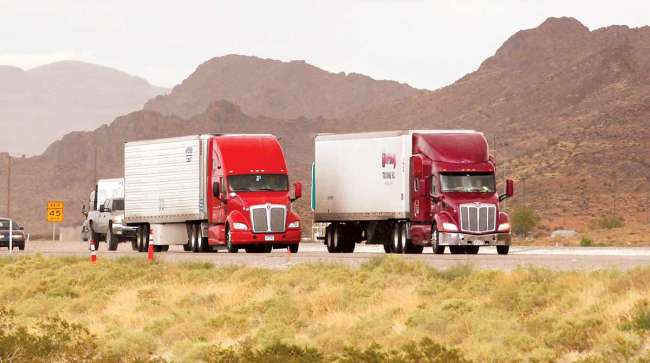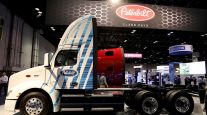Senior Reporter
Paccar Hits Record 2Q Revenue; Profits Surge

Truck maker Paccar Inc. in the second quarter rode strong performances from all sectors of its business to record quarterly revenue and a surge in net income.
Deliveries of its three brands — Kenworth Truck Co., Peterbilt Motors Co. and DAF Trucks in Europe — reached a record 46,400 trucks in the period ended June 30, reflecting strength in North America, Europe, Australia and Brazil, according to the Bellevue, Wash.-based company.
At the same time, net income hit $559.6 million, or $1.59 per diluted share, in the second quarter, 50% higher than $373 million, or $1.06, compared with a year earlier. The Wall Street consensus was $1.42.
“The dramatic increase in net income reinforces Paccar’s financial leadership and strongly positions the company as it invests in new vehicle platforms, technology initiatives such as connected truck, autonomous and alternative fuel systems and developing customer service programs,” Paccar President Harrie Schippers said in a statement.
Capital expenditures of $425 million to $475 million and research and development expenses of $300 million to $320 million are being invested this year in new truck models; integrated powertrains including electric, hybrid and hydrogen fuel cell technologies; enhanced aerodynamic truck designs; and advanced driver assistance systems and truck connectivity.

The company also is expanding its manufacturing and parts distribution facilities.
Revenue from sales and financial services was a record $5.81 billion, 23% higher than the $4.70 billion achieved in the 2017 period.
Revenue from its parts division reached a record $968 million. That was 18% higher than the $823.1 million achieved in the same period last year.
Those gains came as Paccar continues to add global parts distribution centers and focuses on parts sales for its new MX engine — now in the field for eight years — and its global fleet services program.
Its newest distribution center is a 160,000-square-foot facility under construction in Toronto and expected to open in the fourth quarter.
Also, Class 8 retail sales for the United States and Canada increased 32% year-to-date and are expected to be 265,000 to 285,000 in 2018, reflecting a growing economy and record tonnage levels, the company forecast.
European truck industry registrations in the above-16-tonne market are estimated to be 300,000 to 320,000 vehicles in 2018, which would be the third highest in history.
DAF, Paccar’s European brand, earned its record market share of 16.5% year to date this year. DAF’s above-16-tonne orders were 26% higher in the first half of 2018 compared with the same period last year.
“The positive economic and freight growth in North America and Europe are good indicators that 2019 will be another strong truck market,” Paccar CEO Ron Armstrong said.
“While Paccar maintained its industry retail sales forecast for the U.S./Canada and Europe, commentary on 2019 remains very bullish with backlogs already building into 2019 and with greater visibility relative to last year. [Additionally, Paccar] believes [incremental margins] should still remain healthy and within the company’s targeted range of 15-20%,” Credit Suisse analyst Jamie Cook wrote in a note to investors.
Class 8 truck industry retail sales for the United States and Canada have increased by 32% year-to-date and are expected to be 265,000 to 285,000 in 2018, according to the company.
Paccar also repurchased 1.21 million of its common shares for $77.2 million during the second quarter, completing its previously authorized $300 million share repurchase program. An additional $300 million repurchase of outstanding common stock was approved in July.
Its board increased the regular quarterly cash dividend by 12% to 28 cents per share in May.
Meanwhile, R.W. Baird & Co. analyst David Leiker wrote in an investor note that Paccar’s progress may signal a change in the cycle.
“Very strong Q2 revenue, margins [Paccar reported truck, parts and other gross margins of 15%], earnings exhibit all signs that North American Class 8 truck demand is nearing/at a peak,” Leiker wrote.
“Annualized earnings around $6 are 30% above the last peak while NA truck demand is +/-15% higher; management is executing on all aspects of the business. That being said, it’s challenging to see how results get much better from here; we are sellers into the cycle peak.”
On the other hand, Stifel, Nicolaus & Co. analyst Michael Baudendistel has a hold rating on the company.
“While we believe that Paccar continues to execute well and that the strength in trucking equipment will last longer than many expect, we also expect negative sentiment on the name to persist,” he wrote in a note to investors.



